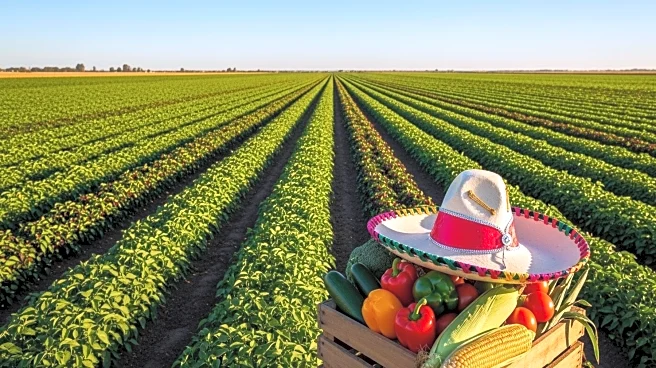What's Happening?
Agriculture Minister Daryl Harrison of Saskatchewan is currently in Mexico to strengthen international agricultural partnerships. The trade mission aims to deepen trade, research, and investment relationships with key stakeholders in Mexico, which is one of Saskatchewan's most significant agri-food markets. In 2024, Mexico was the province's sixth-largest export destination, with $592 million in agri-food exports. The mission seeks to promote Saskatchewan as a reliable supplier of high-quality food and attract investment in its value-added agriculture sector. A key event during the trip is the 2025 Tri-National Agricultural Accord, where agricultural leaders from Canada, the United States, and Mexico discuss shared priorities and cooperation.
Why It's Important?
This trade mission is crucial for Saskatchewan as it prepares for the 2026 Canada-U.S.-Mexico Agreement (CUSMA) Review. Strengthening ties with Mexico could ensure that Saskatchewan's agricultural interests are well-represented in upcoming trade negotiations. The province aims to bolster its reputation as a reliable supplier and attract investment, which could lead to economic growth and increased market access for its agricultural products. The discussions at the Tri-National Agricultural Accord could also lead to enhanced cooperation on issues like animal disease preparedness and the celebration of the International Year of the Woman Farmer in 2026.
What's Next?
The outcomes of the trade mission and the Tri-National Agricultural Accord could influence future trade negotiations and collaborations between Saskatchewan and Mexico. Stakeholders will likely continue discussions on priority agriculture issues, potentially leading to new agreements or initiatives that benefit both regions. The preparation for the CUSMA Review will be a significant focus, as Saskatchewan aims to ensure its agricultural interests are prioritized in the agreement.
Beyond the Headlines
The trade mission highlights the importance of international cooperation in agriculture, especially in the context of global trade agreements like CUSMA. It underscores the need for regions to adapt to changing trade dynamics and seek partnerships that enhance their economic resilience. The focus on the International Year of the Woman Farmer also brings attention to gender equality in agriculture, promoting the role of women in the sector.









